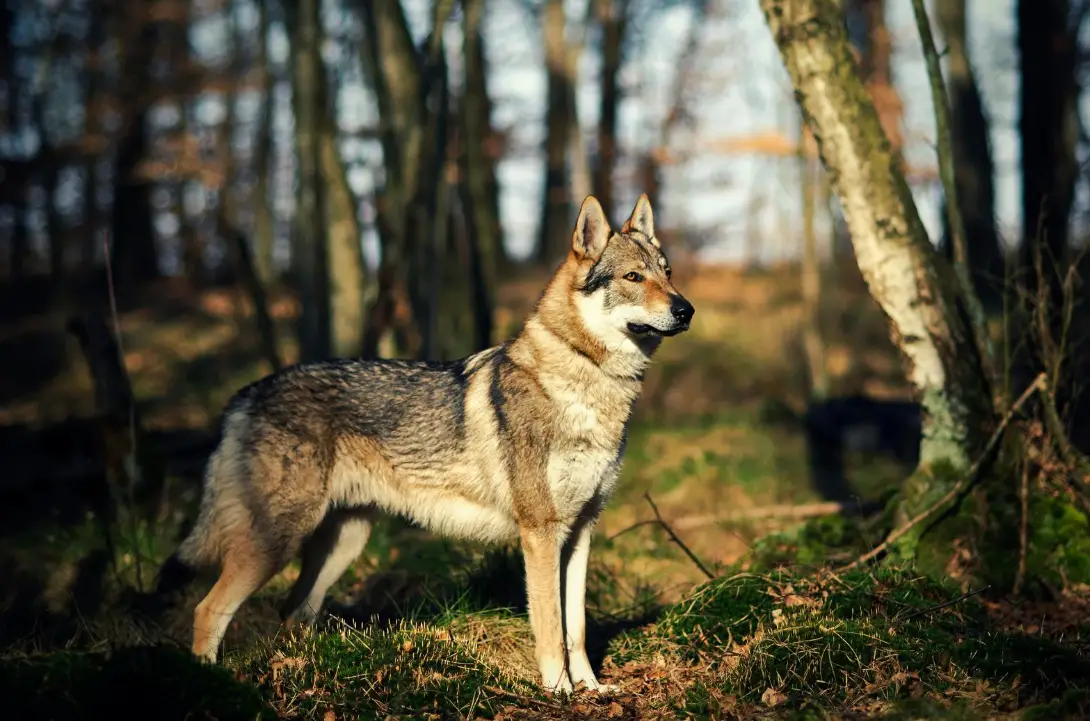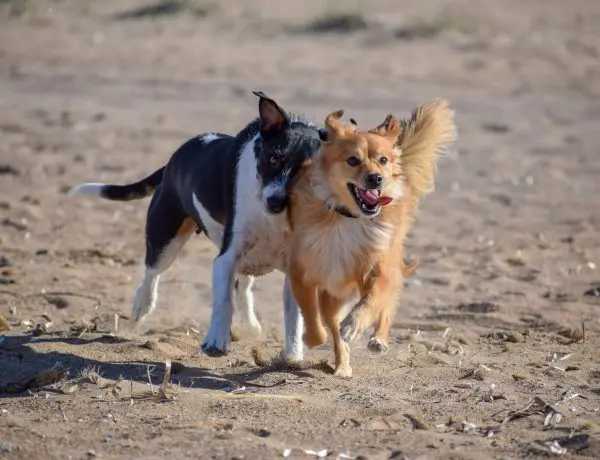Wolves are powerful animals that have many adoring fans. Native Americans have long held the wolf as a symbol of freedom, loyalty, courage, strength, and hunting success. After hearing these characteristics, it is no wonder people are so enamored by the thought of potentially having a wolf as a pet.
Wolfdogs are appealing pets to many people because of their stature, ability to guard and protect their family, and the overall elegant appearance of a wolf. While many people enjoy the idea of having a wolfdog as a pet, others are terrified of the wolfdog and would never attempt to domesticate one.
Wolfdogs are an increasingly popular option when it comes to purchasing a dog for your family. However, many precautions need to be taken when doing so. In this article, you will learn the pros and cons of owning them as well as some alternatives to wolfdogs.
Table of Contents
What is a Wolfdog?
The actual name wolfdog does not leave much room for missed interpretation. A wolfdog is just that, part wolf and part dog.
They are also sometimes referred to as wolf hybrids. These animals are often found in movies and portrayed as strong and aggressive defenders of their owners. Perhaps this is the reason they are growing in popularity and causing people to search out the option of owning their very own wolfdog.
When you look at a wolfdog, you will likely notice the characteristics of both a wolf as well as a domesticated dog. Wolfdogs share both animals’ common physical and behavioral traits. However, there are vast differences when you begin looking at the rate of maturity, hormonal changes, and instincts that impact the wolfdog compared to its domesticated counterpart.
How Many People Own Wolfdogs?
It is believed that nearly 300,000 wolfdogs are owned as pets in the United States alone. While this number is not exact, wolfdogs have a strong following and are quite popular. It is unknown if these wolfdogs have made it through their entire lifespan with the family they are adopted into.
Is it Legal to Have a Pet Wolfdog?
Before bringing any dog into your home, not just a wolfdog, you need to research your local laws and requirements. In many states, homeowners insurance companies will not cover the following breeds under their policies:
- Akitas
- Alaskan Malamutes
- Chows
- Doberman Pinschers
- German Shepherds
- Great Danes
- Pit Bulls
- Presa Canarias
- Rottweilers
- Siberian Huskies
- Staffordshire Terriers
- Wolf Hybrids
Insurance companies view these breeds of dogs as extremely high risk to both property and humans. If something unforeseen occurs when you take ownership of a wolfdog, you could be risking the euthanization of your beloved pet and a hefty lawsuit. Because wolfdogs are considered high risk, many states have made the sale and ownership of them illegal. Here are the states that currently do not allow wolfdogs to be kept as pets:
- Alabama
- Arkansas
- California
- Delaware
- Florida
- Idaho
- Kentucky
- Maine
- Maryland
- Mississippi
- Missouri
- North Dakota
- South Dakota
- Pennsylvania
- Virginia
If an individual is found with a wolfdog in their possession in these states, they can face fines as well as have the animal removed from their possession. Each state differs in the amount of the fine they charge for being “caught” with a wolfdog. When you begin to search for the legal ramifications of owning a wolfdog, be sure to look at the wild and exotic pet laws for your state.
Pros of Owning a Wolfdog
Before purchasing a wolfdog, it is essential to consider to pros and cons of owning one as a pet. Unfortunately, the pros of living with a wolfdog pale in comparison to the cons, but let’s take a look at some of the advantages first.
They Prefer the Outdoors
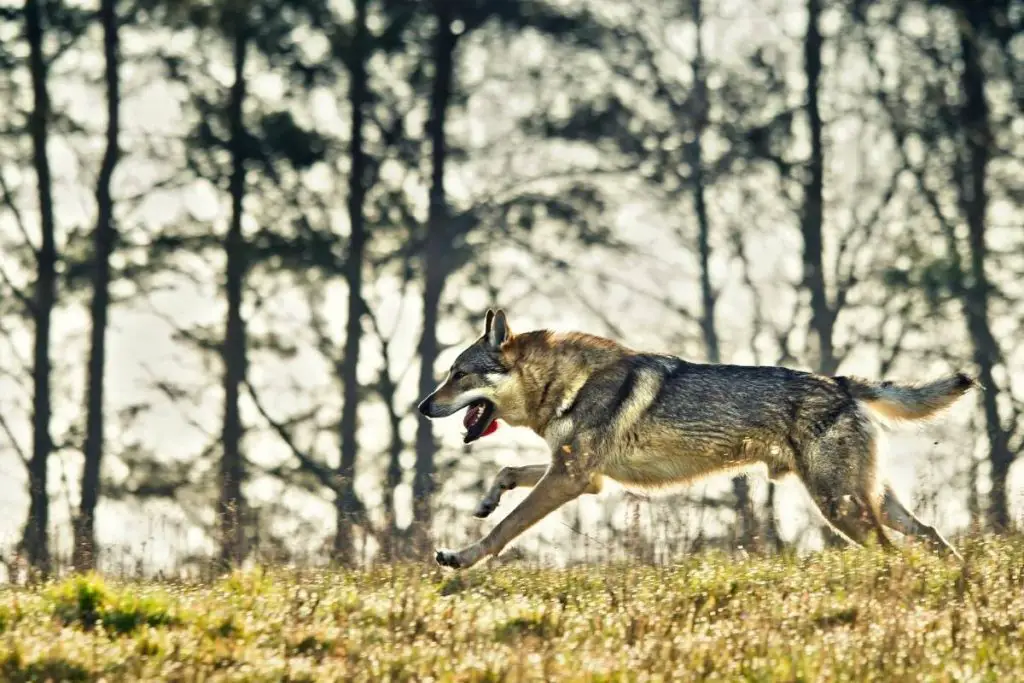
Wolf dogs generally do not like to be confined to the indoors. They have the genetics of a wild animal, and closed in spaces will often frustrate them. Therefore, if you are looking for a dog that could happily survive outside only, this would be one advantage of having a wolf dog. Although they may be happier outside, you must follow precise guidelines to ensure that people and other animals are safe when near your wolf hybrid. You should also be aware of the weather and make sure your wolfdog has protection from the elements if you live in an area with extreme temperatures.
They Need Human Contact and Supervision
If a wolfdog has been raised with people from puppyhood, they will have a strong desire to be with their people. Because they are pack animals, being alone takes away their sense of security. You will need to spend several hours each day with your wolfdog. This will help with socialization and avoid separation anxiety.
They Are Intelligent and Curious
Wolves are highly intelligent animals. They are also naturally curious animals and will spend lots of time exploring everything around them. While this can be great, it can also lead to destructive behavior as they investigate.
They Are Often Able to Bond with a Human
Wolves are pack animals and tend to hold a bond with their pack. This can also happen to a degree with their owner. It is believed if the wolfdog is weaned early and the owner is left to bottle feed the pup, the bond will be much stronger. While their bond may be strong with a human, it will likely not be as strong and trusting as a bond with other wolves.
Several positives come with owning a wolfdog. However, each of the pros has a caveat that must be considered. A wolfdog is still a wild animal that will never be able to be fully trained like a domesticated dog. While the wolfdog may be able to do the above things successfully, there is always an unpredictability that must be considered.
Cons of Wolfdogs
When considering a wolfdog as a pet, many disadvantages need to be discussed and understood clearly. It may be a nuisance to see all the cons, but you must know what you are getting into in the case of a wolfdog. Yes, they are majestic and beautiful animals, but they can be extremely unpredictable and dangerous as pets.
They Are Difficult to Train
Wolfdogs are notably challenging to train. They are a wild animal with wild animal adaptations. No matter how much you try and how much money you spend, you cannot change genetics. Dog trainers that have attempted to train wolfdogs have often not been successful. Unlike domesticated dogs, wolfdogs do not have the internal drive to please their owners. As a result, teaching them to follow commands on cue can be difficult.
They Are High-Maintenance
Wolfdogs are incredibly high maintenance. Not only do they require constant interaction, but they also require very specialized care and housing. A wolfdog’s diet needs to be carefully metered and prepared to ensure their health (regular dog kibble is often not enough).
Housing is Challenging
Although the wolfdog has a wild dog’s genetics, it cannot survive in the wild after being exposed to humans and the domestic way of life. The wolfdog likes to escape enclosures because they do not like to be caged up. Therefore, you need special housing that can hold a strong and curious animal. Additionally, wolfdogs thrive in a quiet environment, so the area where they are housed needs to be quiet.
They Have a Strong Prey Drive
Wild animals have a natural prey drive, which is how animals instinctively know when to hunt and capture small animals for food. This prey drive can even be evident when they see a small child running. While it may appear that the wolfdog is playing, it could be preparing to attack the child. Prey drive is something that can be extremely difficult to be conditioned out of an animal. It is an innate instinct that will prevail throughout their training. Most domestic dogs can learn to control the drive, but wolfdogs likely will never have total control over this instinct.
They Communicate Like a Pack
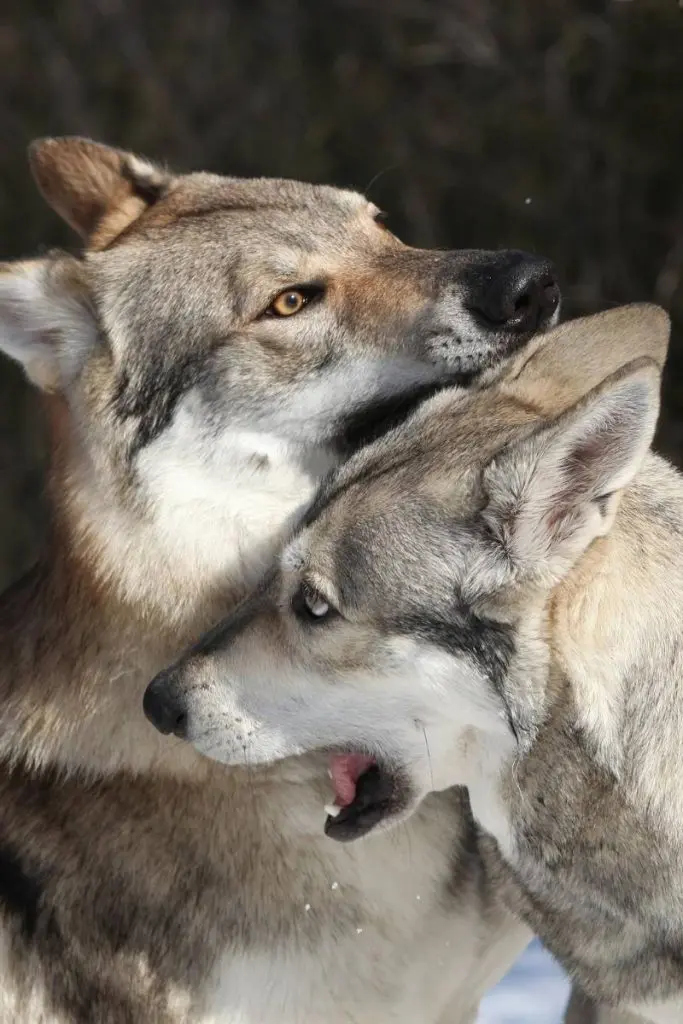
Wolfdogs communicate with their mouths, not only do they tend to be vocal, but they also will bite and hold things. If this is something you are not comfortable with, a wolfdog might not be the best choice for you.
They Are Shy
Often, people assume that wolfdogs are the ultimate in protection. While they may appear rough and tumble, they are very timid. Because they are so shy, they are often not good guard dogs. Instead of standing their ground against an unwanted visitor, they are more likely to retreat to safety.
They Are Unpredictable
Wolf dogs are highly unpredictable. While most dogs become more laid back and are easily trained as they get older, wolfdogs become more challenging to control. As the wolfdog matures, more of their true instincts come out, which can be both unsettling and dangerous for the owner.
They Are Often Not Good with Children
If you are thinking of getting a wolfdog as a family pet, think again. Wolfdogs enjoy quiet, not the noise of excited children or busy families. It has been shown that wolfdogs have difficulty controlling their prey drive around children and may mistake them for small prey. The amount of unpredictability that comes with owning a wolfdog makes them unsafe to have around children, especially since training is extremely challenging with the breed.
Finding a Veterinarian is Difficult
Most veterinary clinics refuse to treat wolfdogs in their practice. It is not because of inability, but rather the liability of doing so. Remember the unpredictable nature of a wolf hybrid? The vet cannot risk injury to themself, other employees, or patients. By treating a wolfdog, they are putting others at risk unnecessarily.
They Are Not Working Dogs
Other intricately linked dogs to the wolfdog, such as German Shepherds and Siberian Huskies, are known for their ability to work with and for humans to help expend their energy. Wolfdogs are not working dogs. The only way for a wolfdog to expend energy is by roaming freely in a large area. Many domesticated dogs have been selectively bred for hundreds of years to work with humans. This is not the case with wolf hybrids.
Housing Requirements of Wolfdogs
One factor that stands out when looking to have a wolfdog as a pet is the strict housing requirements. Unlike a domestic dog, you cannot just put a dog-house in the backyard with a simple chain link or wooden fence for a wolf hybrid. Wolfdogs are impressive escape artists and need to be treated as such if you are creating a home for them.
Building a wolfdog enclosure requires specific materials that are “wolf-proof.” It is recommended that the enclosure be at least one acre with a 10-foot fence made with 9-gauge wire. This is not just a normal dog pen! You also need to have a special metal mesh attached to the bottom of the fence and buried underground. This helps prevent the dog from digging under the fence to escape.
Wolfdogs will try to escape any form of enclosure, not only can they jump and climb (hence the 10-foot fence), but they are also crafty diggers. If you do not add the bottom layer of mesh, you will run the risk of the wolfdog digging out of the enclosure. Along with the metal mesh, it is recommended that a layer of rocks or logs be placed around the bottom perimeter of the fence. This may look aesthetically pleasing, but ultimately it is to help prevent an unwanted escape from occurring.
When constructing the enclosure, you also need to plan for double gates that will lock. Because a wolfdog can be unpredictable, you do not want anyone to have easy access to the pen. If someone would happen to wander into the pen, it could have unbelievably adverse consequences.
When choosing a location to build the wolfdog enclosure, you need to be sure the area offers plenty of vegetation for shade and is in a quiet location. Wolfdogs do not do well with loud and busy environments.
Why So Much Space?
One full acre is a tremendous amount of space for a domesticated dog; however, you need to remember a wolfdog is not a regular dog, and one acre is very minimal for them. If you have access to more land, it would be better for the wolfdog’s health, but it still needs to be enclosed to protect anyone that may come across the area.
Wolfdog Dietary Needs
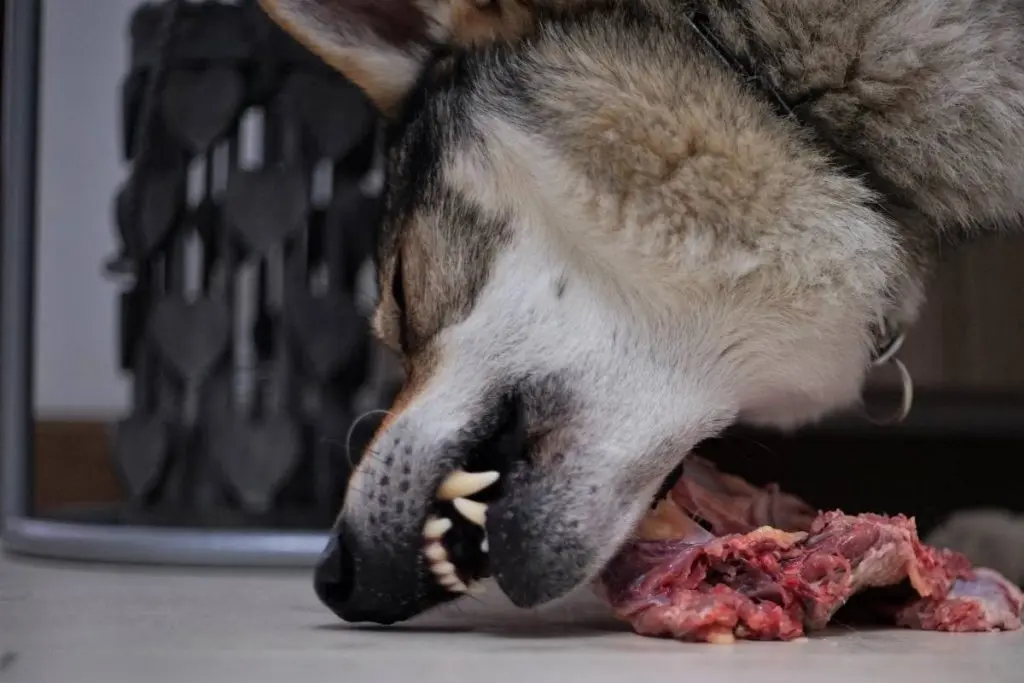
A wolfdog is not the same as the domesticated dog people are used to. It should come as no surprise that their diet is hugely different as well—wolfdogs tend to be more like wolves when it comes to eating. Regular dog kibble is not something usually ample food for a wolf hybrid. Wolfdogs need a diet with plenty of raw meat. Typically, a wolf would eat off the land by hunting deer, elk, bison, and other wildlife. When you have a wolfdog as a pet, you will likely not be able to obtain the wild meat they are used to. In this case, you will need to move to the next best thing you have access to. Wolfdogs can do fair with diets of chicken, turkey, and beef. When giving these items to your wolfdog, it is preferred that you feed them raw. They can digest raw bones. However, please do not give them cooked bones as they could be dangerous when they are trying to swallow and digest them. It is also not recommended to provide a wolfdog any form of pork, as would not be a part of their regular diet.
Supplements for Your Wolfdog
Although you may do a fabulous job feeding the wolfdog all the raw meat they desire, they will still be missing many essential nutrients necessary for their health and development. Supplementation will be required for them to maintain a certain degree of health.
Veterinarians often recommend the following supplements:
- Vitamin C
- Vitamin A-B Complex
- Vitamins D and E
- Fish Oil
- Glucosamine
- Alfalfa
- Pumpkin
- Garlic
When choosing supplementation for your wolfdog, you should consult with an expert on the wolfdog breed. Providing a cocktail of supplements that you think are necessary could be extremely dangerous to the animal.
Medical Care for a Wolfdog
As mentioned earlier, veterinary care may be challenging to find for your wolfdog because of the risk they can present to people. When you own a wolfdog, you must be open and honest with the veterinary clinic. Placing your vet clinic employees in a possibly dangerous situation is not morally or ethically acceptable.
Vaccines
All domestic dogs should have the proper vaccines. If you seek vet care or board your dog, they are often a pre-requisite to that. However, because wolfdogs are a hybrid, they are usually classified as wild or exotic animals. One of the most crucial vaccines received by dogs is the rabies vaccine. Not only does this vaccine protect the dog from being infected with the disease, but it also offers protection in case the dog bites a person. Because wolfdogs are considered wild, they are not legally able to receive this vaccine. They are ineligible for this vaccine because of the potential risk to their health upon receiving the vaccine. According to the American Veterinary Association, there is currently no rabies vaccination approved for use in wolf hybrids. Pet owners know the importance of vaccines for health, and rabies vaccines especially are also required in many states to license your dog. Without proper vaccines, you will be unable to obtain a license, which could result in a fine or having the dog removed from your home.
Adopting a Wolfdog
If you are still interested in a wolfdog, you need to understand they are not an inexpensive pet. A wolf hybrid will cost you both time and money both to purchase and to ensure their safety. The cost of the dog itself will likely be between $200- $1,000. When you decide to purchase a wolf hybrid, you need to find an extremely reputable breeder that will provide accurate historical information to you about the dog. Finding a reputable wolfdog breeder may prove to be extremely difficult. However, many wolfdog sanctuaries offer dogs for adoption. When you are going to a sanctuary, there will be very rigid guidelines that you must be willing to adhere to such as:
- A proper enclosure – Remember, they are escape artists. A sanctuary will not allow one of their dogs to be adopted into an unsafe environment.
- Time – Wolfdogs are incredibly social animals and need to have a lot of time and attention devoted to them.
- Space – Wolfdogs like to roam and explore; you need to be able to provide this to them.
- Experience with wolf hybrids – Not all rescues will require this, but it will likely be a question that comes up simply because wolfdogs’ needs are so different from domestic dogs.
Life Expectancy
You may be wondering what the actual life expectancy of a wolfdog is. On average, it is 12 -14 years, which is comparable to that of a domestic dog. While this may make you breathe a sigh of relief, this is an exceptionally long commitment for an animal that is going to require lots of time and maintenance. As a result, it has been discovered that most wolfdogs are turned over to sanctuaries or euthanized by the time they are three years old.
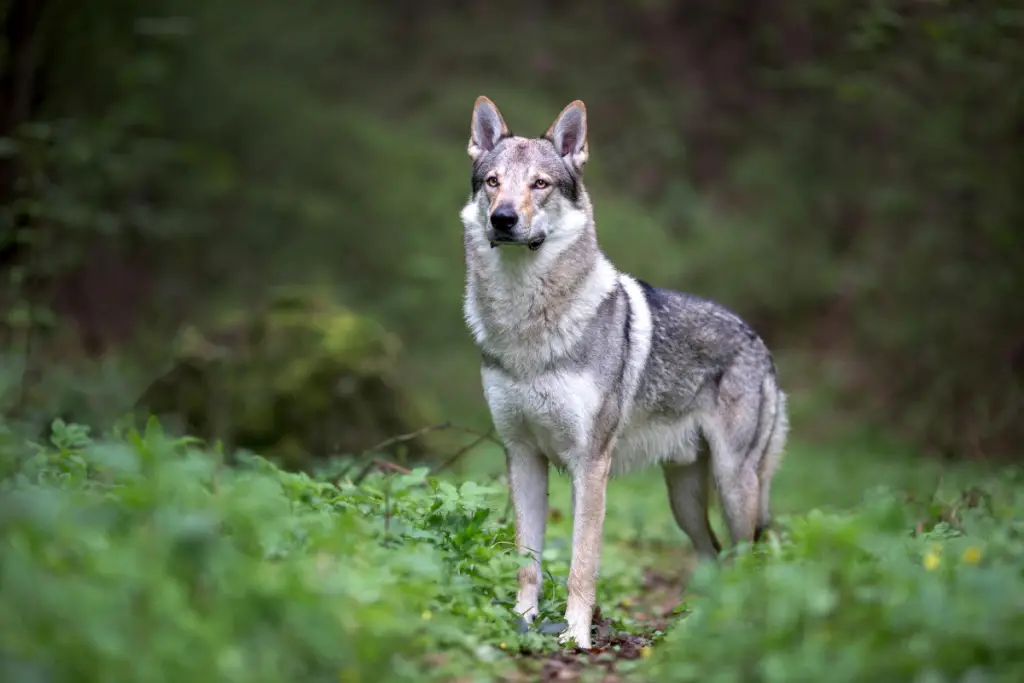
When an owner is no longer able to control the dog, they may turn to a local animal shelter for help. However, because wolfdogs often lack the proper vaccines, shelters cannot usually adopt the animals to new owners. Therefore, the only option is euthanization. It is estimated that nearly 80% of adopted wolfdogs are euthanized by the time they are 2-3 years old.
What if My Wolfdog Hurts Someone?
One concern that may come into your mind is about the risk associated with the unpredictability of a wolfdog. What if your wolfdog suddenly injures or kills another person or animal. Assuming you are in a location where you legally own the wolfdog, you will be held accountable for the damages of your wolfdog. There will likely be an investigation into the way you cared for and housed the dog as well. If you are not in compliance with the state ordinances for a wolfdog, you could face a higher penalty.
There are limited protections for you simply because a wolf hybrid is a known risk when it comes to predictability and the potentially aggressive nature of the breed. Therefore, you need to make sure you are legally able to own a hybrid dog, and that you comply with the requirements that go along with ownership.
Alternatives to Wolfdogs
If you are now second-guessing your decision to adopt a wolfdog, other options may give you the same feel as a wolfdog without the excessive danger. Some dogs that rival a wolfdog in appearance are German Shepherds and Siberian Huskies. Both breeds are extremely intelligent and highly trainable. Because they are more trainable, the risk level is lower when it comes to unpredictability. However, it is essential to know that both breeds have a significantly higher prey drive than many other breeds. While that prey drive cannot be turned off completely, domesticated dogs can often be trained to subdue it.
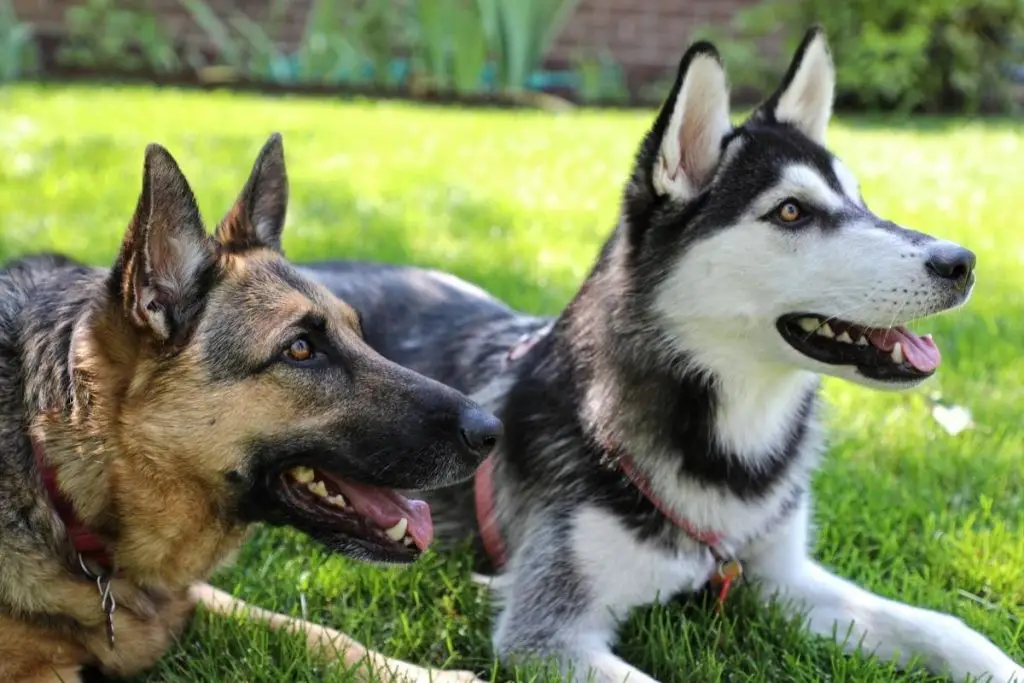
You will also be able to form a better family bond with these breeds of dogs. Unlike the wolfdog, these dogs thrive in families and can become very protective of their pack. They are also typically much better with children, so you likely will not have to worry as much about them causing harm. Of course, this is all under the assumption the dogs receive proper training and are cared for correctly.
Final Thoughts
Wolfdogs are magnificently beautiful creatures that are highly coveted. However, the commitment that you must make to ensure your wolfdog has a happy and healthy life is quite significant. Adopting a wolf hybrid can be a magical experience, or it can end in absolute heartbreak for both you and the animal. Before choosing to adopt a wolfdog, make sure you are up to the challenge set before you.
There are many disadvantages to owning a wolf hybrid, but there are some positives as well. And, in some cases, those positives may outweigh the negativity surrounding wolfdogs. Be prepared for a 12 to a 15-year commitment that will likely include a lot of challenges if you choose to venture into the world of wolfdog ownership.

